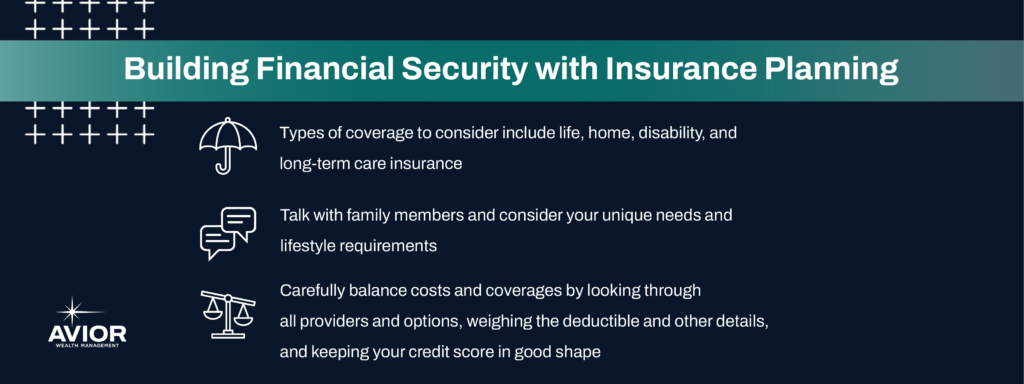Building Financial Security with Insurance Planning
Are you being proactive about insurance planning? Find out why it’s a critical part of risk mitigation and financial security.

You began your financial planning journey to build financial security far into the future. Insurance planning plays a key role, helping you leverage various types of coverage to safeguard your wealth, prioritize risk mitigation, and improve your financial well-being.
Insurance planning considers how different types of plans protect your assets, providing another method for diversifying your portfolio and taking advantage of tax benefits. No one can predict the future, but with the right insurance strategy, you can continue to move forward when you face a setback.
This guide explores key insights on how to build financial security through thoughtful and comprehensive insurance planning.
Types of insurance to know
It’s not easy to understand all the different insurance types out there and how they align with your financial goals. Let’s look at a few types of insurance that you might consider as part of your financial plan and why they’re important:
- Life: This type of coverage is especially important in your family’s financial strategy. Life insurance provides benefits to certain family members after you pass away, ensuring they are fiscally protected once you’re gone.
- Health: You may receive health insurance benefits from your employer, or you may purchase a plan through the government’s online Marketplace. Either way, health insurance is critical to reducing overall healthcare costs and receiving care from the medical providers of your choice. Choosing the right health insurance requires weighing monthly premiums against details like the deductible and out-of-pocket maximum.
- Disability: Long-term and short-term disability insurance helps protect a portion of your income should you be unable to work for some time or even indefinitely. This coverage is wise if your family primarily depends on your income.
- Long-term care: Many people reach a point when they’re no longer able to perform activities of daily living (ADLs) on their own, such as dressing, eating, and bathing. Investing in long-term care insurance early helps you get coverage for long-term care down the road.
- Property: Property insurance protects major assets like your home in case of a natural disaster, theft, or other catastrophe, like a fire.
- Auto: Car insurance is required in most states and it works similarly to other types of coverage. You pay an agreed-upon monthly premium based on your coverage selections and benefits kick in if you have a qualifying accident or event.
Understanding these common insurance options is key when you’re thinking through what you want your coverages to look like. Next, it’s time to align your goals and your family’s needs with your insurance plan.
Analyzing your insurance needs
A few different factors impact your insurance needs. Talk through these components with your family and financial advisor as you’re making insurance decisions:
- Lifestyle: Consider what kind of lifestyle you live and what you picture your future looking like. Bring in your spouse or children to discuss their ideas and dreams as well.
- Assets and liabilities: Make a list of your current assets and liabilities. Identify areas that you need to protect with insurance coverage.
- Goals for the future: What do you want to accomplish in the next few years? What about when you retire? These goals can impact the kinds of insurance you invest in.
Evaluating these areas will help you uncover protection requirements. For example, you may have realized that without your normal income, your family will struggle to maintain their desired lifestyle. This means you want to start looking at disability insurance in case you become ill or injured and can no longer work.
Also, consider that your insurance needs may change in the future when life changes occur, such as marriage, children, and career changes. Keep an open, flexible mindset so you can alter your insurance plan when necessary.
How to balance coverage and cost
Cost is probably the biggest concern when you’re making insurance decisions. You want monthly premiums to be affordable and yet you want sufficient coverage to make the investment worth it.
First, consider all your options for insurance providers and policies. You don’t have to purchase the first plan you come across. Talk to your financial advisor about where to find new options and what to look for when sifting through all of them.
Then, consider how deductibles, limits, and exclusions play a role in your coverage possibilities. Weigh the monthly costs – and overall annual costs – against the potential benefits you could have if you end up needing coverage.
You may also be able to save a little money if you go with bundles. Many providers offer bundled insurance, like home and auto, so you have your coverages in one place and enjoy a lower monthly cost.
Finally, strive to maintain a good credit score. Your credit score is used by insurance companies to assess your options for coverage and your monthly premiums and rates.
Harnessing insurance for risk mitigation
Prioritizing insurance planning contributes to a comprehensive risk management plan. And, it helps you ensure ongoing financial security for you and your family members.
Evaluate common types of insurance you should consider, carefully review policy terms and conditions, and continue reviewing plans and coverages each year. Your needs may change, but so could costs and rates.
Risk mitigation starts with the right insurance plan. Approach this type of planning as an integral part of your overall financial strategy.
Work with Avior to stay proactive about financial planning and wealth management. We will help you understand your options, align selections with your goals, and regularly review your policies moving forward.
Talk to the Avior team today to get started with insurance planning.
Disclaimer: Nothing contained herein should be construed as legal or tax advice. Avior and our Advisors will work with your attorney and/or tax professional to assist with your legal and tax strategies. Please consult your attorney or tax professional with specific legal and/or tax questions. Investment Management and Financial Planner are offered through Avior Wealth Management, LLC, an SEC-registered investment advisor. Past performance is not a guarantee of future results. Investments are subject to loss, including the loss of principal.
No Comments
Sorry, the comment form is closed at this time.




